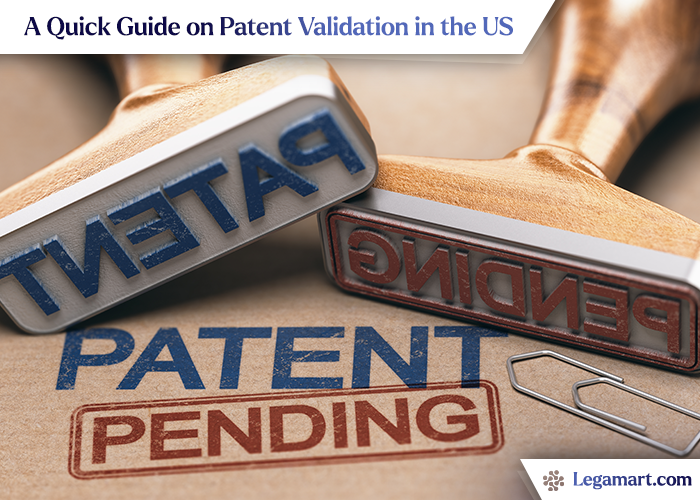Are you an inventor/creator who loves inventing new things?
Then, it is inevitable that you haven’t dreamed of getting patent validation for your invention at some point in your life. Having exclusive ownership of your invention is not only the last step in the invention process but also works as a long-term protection measure—especially important in the context of Cross-Border & International Law, where safeguarding intellectual property across jurisdictions becomes increasingly vital.
. In addition to understanding patent validation, it’s essential to be aware of other intellectual property considerations, such as copyright infringement in social media platforms, which can also impact your innovative creations. So, here’s a quick guide on patent validation in the US, that covers the major aspect like for what time your patent will be valid, can a patent be renewed, and how you can avoid patent infringement.
Introduction
Patenting is a golden opportunity to gain exclusivity, protection, reputation, licensing, and trust in the market for your creation.
Almost every invention in today’s world can be patented, from medicines, computer programs, chemicals, machines, and bio-genetic materials! You ask for it, and you can get it patented. However, here’s a disclaimer: Patenting your product can be tedious. As per 2020 data by USPTO, 6.4 lakh applications were submitted for patent. However, only 53% received patents in the USA. That’s a whole separate discussion.
Back to the topic! So imagine you were among the 53% who received the patent. Now, the question arises:
What is Duration of Patent Validation in the US?
Patent validation depends on the type of patent. However, any patent is protected for a maximum period of 20 years from the filing date of your application. The three most common types of patents are:
- Design patent: As the name suggests, it is related to the design or the product’s appearance. Essentially, it refers to the product’s ornamental look and exterior. For example, the shape of a bottle or user interfaces in the case of software. Design patents are given patent protection for 15 years.
- Utility patent: This includes machines, articles of manufacture(e.g., tools), chemical composition, and process and is given patent protection of 20 years. This patent covers simple inventions like board games and candleholders.
- Plant patent: This patent deals with newly invented species commonly patented by agriculture specialists, like varieties of fruits, vegetables, flowers, etc. Unlike the above, this doesn’t require maintenance fees and is given patent protection for 20 years.
Can a Patent be Renewed after 20 years?
No, a patent can’t be renewed after expiration, and they are not for an indefinite term. In common parlance, patents are maintained and not renewed. In the next section, we discuss the circumstances under which the patent term can be reduced.
In What Circumstances can the Patent Validation Expire Before 20 years?
- Missing the deadlines for maintenance of fees: During the Patent’s lifetime, the USPTO requires maintenance fees to be submitted three times. The fees are divided like this: $800 (first installment), $1800 (second installment), and $3700 (the third installment).
- If it was found that the Patent was invalid: If an infringement case has been filed and your Patent has been found invalid, in that case also the patent protection will end before the timeline.
- In case of misconduct: When an applicant has committed misconduct against the USPTO or committed any illegal acts related to his Patent.
How Long is a Patent Valid in Other Countries?
A patent is granted per territorial jurisdiction; hence, patent rights are limited to the county you have filed the patent application in.
Moreover, like copyright, the Patent doesn’t have an international patent, but there are international conventions to protect your Patent filed in the US in other countries. Some international conventions are
- The Patent cooperation treaty
- The European patent convention
- The Paris Convention
What is Patent Infringement and How to Avoid it?
When a third party uses a patent without the consent or license of the patentee, it is considered to be in violation of the patentee’s right with respect to their invention/creation, known as Patent infringement.
What are the 3 Ways to Avoid Patent Infringements?
- Invent and test: This is the 1st step in the process, where a person focuses on creating new technology and finding out whether it has the potential to be patented. To do so, you need to research similar ideas that have already been developed and patented.
- Recognize and Avoid: Patenting a similar product starts with the success of an earlier creation, as everybody wants to create a similar product, but with slight differences. Hence, in these cases, you must search for patents and ensure they do not violate the original Patent and don’t cause any complications once patented. If it does, it is better to avoid going further with the same invention without tweaking the procedure and making slight changes in the production.
- Investigate, create and check: Considering the variety of patents, there is a dire need to investigate competing patents. With a high number of patents, concept generation is a deal-breaker, which provides both commercial and user benefits.
Conclusion
The biggest takeaway from this blog is, that it’s important to do your research about your idea and invention to protect your intellectual property. Take note of each step in the process that goes into inventing the product. The problem is that patenting is not an easy journey, but it can be removed very easily if you have infringed on another’s Patent. Hence, it is advisable to always hire a patent lawyer while embarking on the journey of patenting your invention.
Uncover the steps and procedures for immigration to different nations, with a focus on Turkey to Norway and US to Portugal, in Legamart‘s insightful articles.




